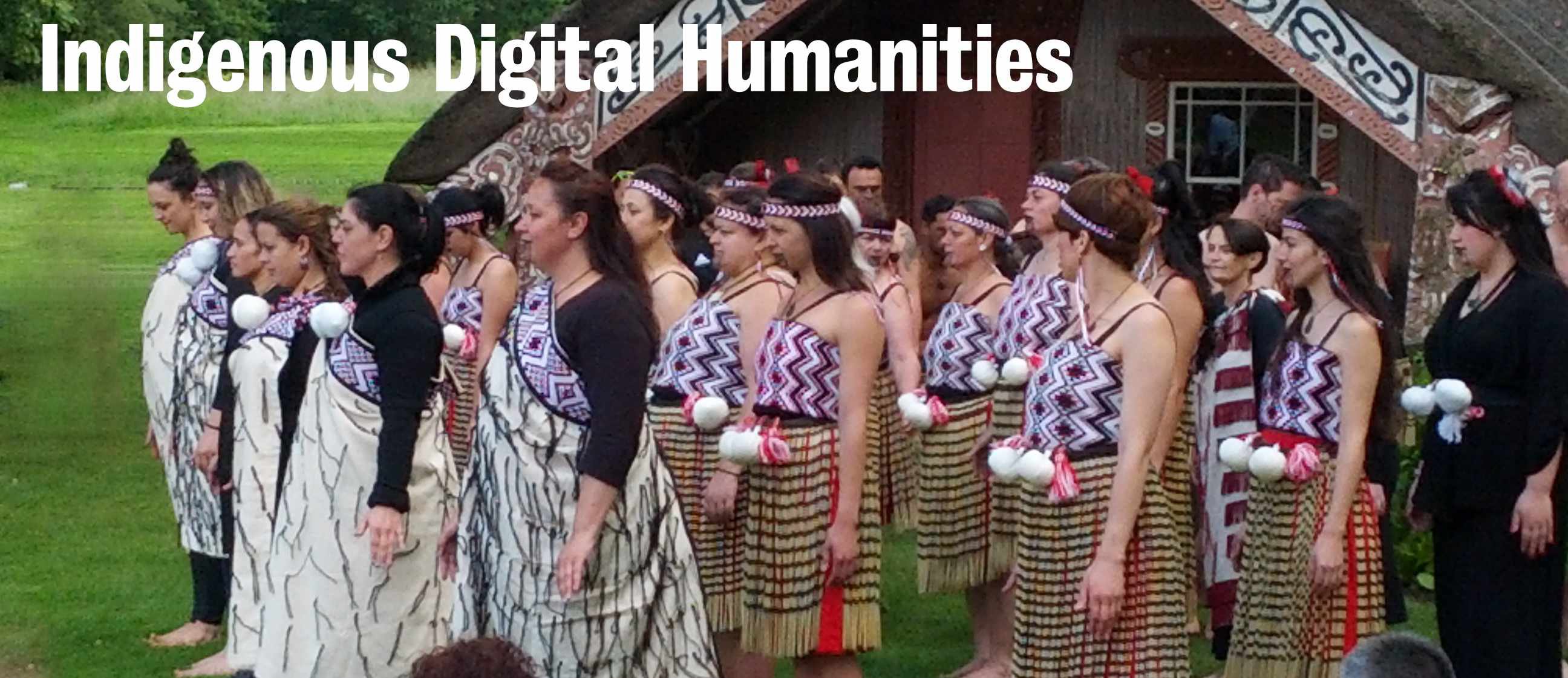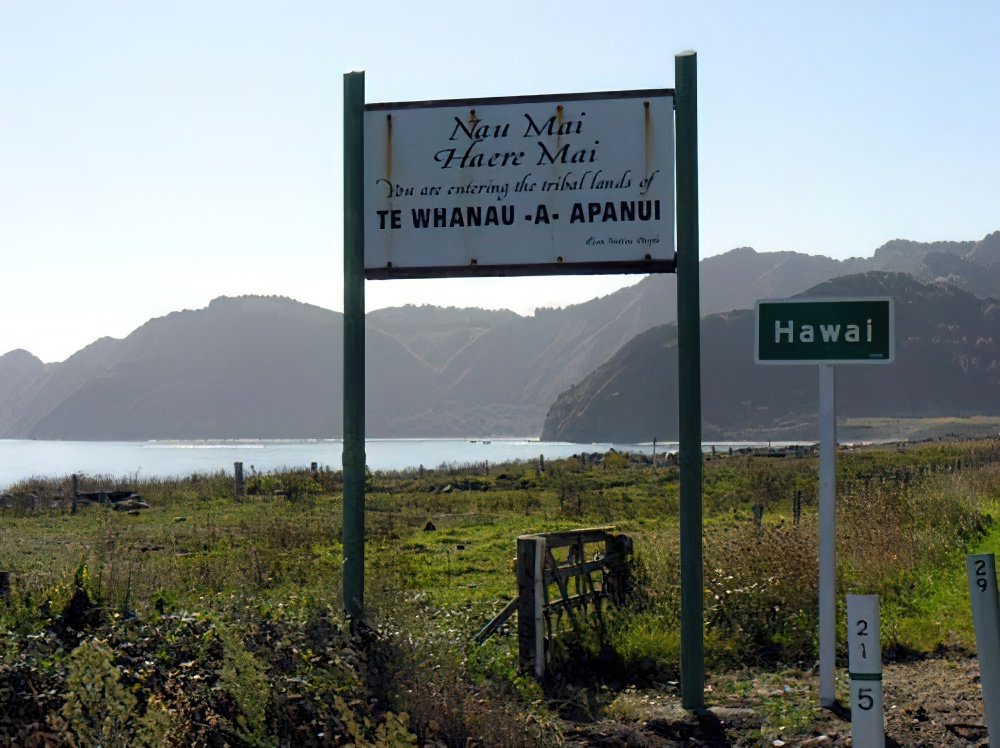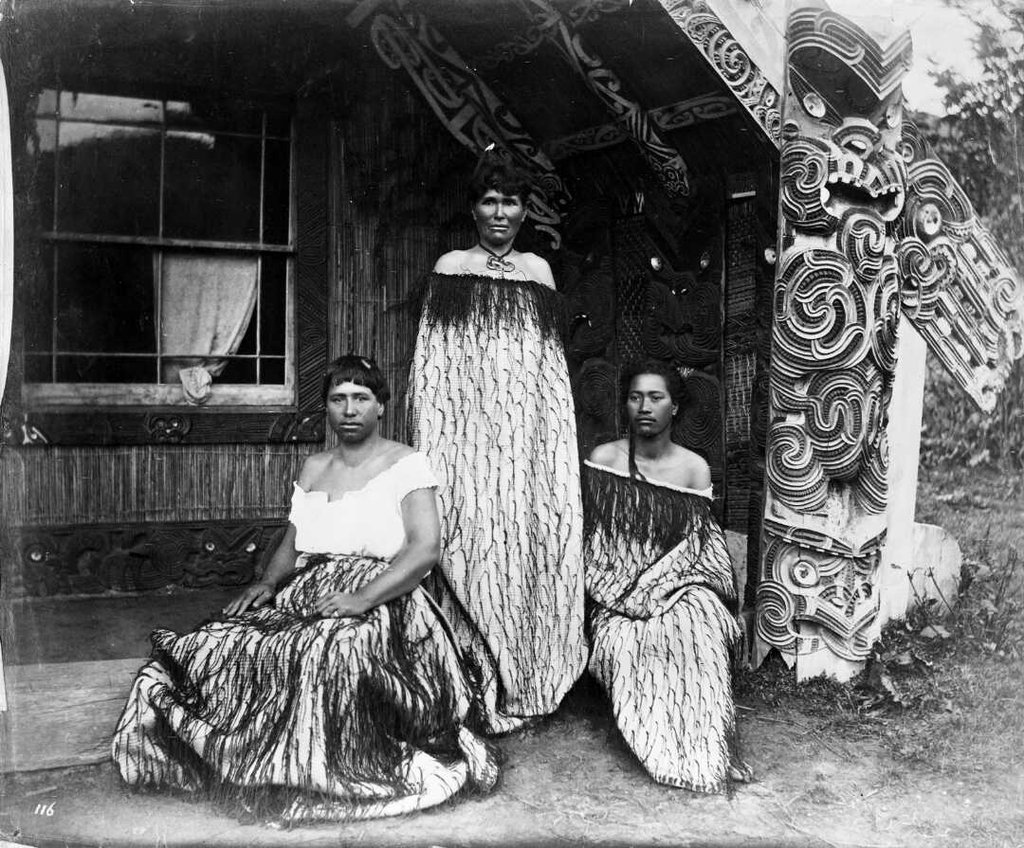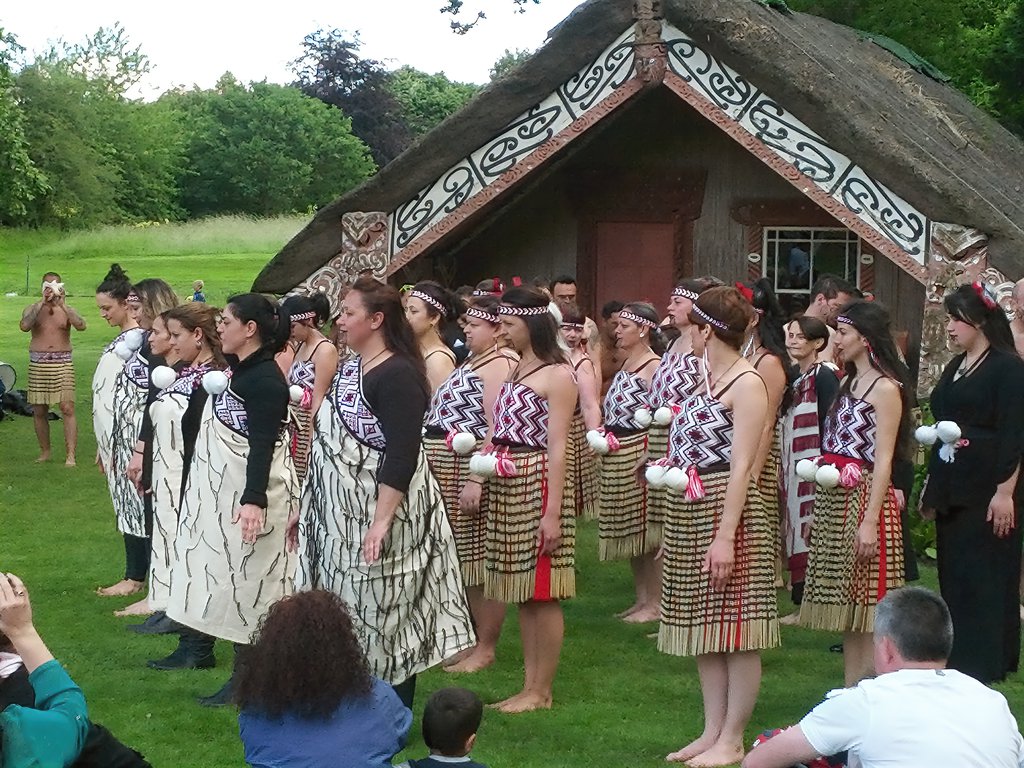Indigenous Digital Humanities

Whaia e koe ki te iti kahurangi, kia tāpapa koe,
he maunga tiketike
Follow your treasured aspirations, if you must bow your head,
let it be to a lofty mountain
Nāku te rourou, nāu te rourou,
ka ora ai te iwi
With my basket, and your basket,
we will feed the people
Ko wai au? (Who am I?)

Te Whanau a Apanui sign, Hawai by Te Ara, 2007. Reproduced under CC BY-NC-SA 2.0
Ko Te Whānau a Apanui rātou ko Ngāti Kahungunu, ko Ngāi Pākehā ngā iwi. Ko Te Whānau a Pararaki rātou ko Te Whānau a Maruhaeremuri, ko Ngāti Pāhauwera ngā hapū. Nō Raukokore, nō Waihau Bay au engari i tipu ake ahau ki Heretaunga, ki Ahuriri, ki Wairoa nei. Ko Samantha Callaghan tōku ingoa. E mahi ana au ki King’s Digital Lab; he Kaitātari ahau.
My name is Samantha Callaghan and I am of Māori (Indigenous peoples of Aotearoa/New Zealand) and Pākehā (European New Zealander) descent. I am a Research Software Analyst at King’s Digital Lab (KDL). I was previously based in the Lab as the Metadata Analyst for the Georgian Papers Programme.
Introduction
N.B. Te Reo Māori/Māori language terms are included in this post in alignment with its kaupapa (theme).
Given the breadth of the kaupapa it is not my intention to be exhaustive in any way. Instead, I will touch on Indigenous Digital Humanities, my outreach work, the work we do in the Lab, as well as the research theme we are developing.
Indigenous Digital Humanities (DH) as we use it at KDL can mean:
- DH projects working with Indigenous data, material, knowledge and expressions;
- DH projects working with Indigenous communities; or,
- DH projects built using Indigenous methodologies and/or underpinned by Indigenous epistemologies.
The definition of ‘Indigenous’ as a term itself is contentious and we do not seek to explicitly define it. Instead, we follow the practice used within the UN Declaration on the Rights of Indigenous Peoples that explicitly does not include a definition of Indigenous peoples to ensure that it cannot be used to deny certain groups the defined rights included in the Declaration.
Outreach
A substantial amount of work that underpins some of the thinking for our developing research theme is my outreach work. I’ve spoken to GLAM (Galleries, Libraries, Archives and Museums) sector staff and academics at conferences, symposia, seminars, and by invitation to the DH Oxford Summer School and the Tate Britain. Some of this outreach work has been supported by KDL; other outreach has been done via my volunteer work with Te Maru o Hinemihi, a pūkenga (expert) group predominantly based in the UK supporting the care, and now exchange, of the wharenui (meeting house), Hinemihi o te Ao Tawhito. My volunteer work is, at times, supported via the Service Time policy here at King’s.

The sorts of topics I cover when speaking have overlaps based on audience. When speaking to GLAM sector practitioners I place more focus on consultation/co-working, taonga (treasures) and reconnection, as well as data sovereignty. When speaking to academics I focus more on data and data sovereignty while also highlighting relationship building and consultation/co-working.
In almost all my presentations I will include a ‘Questions for You’ slide asking attendees to consider the following:
- What is the data/digital cultural heritage you are working with? What are its sources? Does it contain: inconsistencies; outdated or out-moded descriptions; problematic terminology; or singular, Eurocentric forms of names? How will these be addressed?
- Does the data have a source community or communities? Are they Indigenous? Minority ethnic? Religious? LGBTQ+? Or another minority community?
- If there is a source community or communities with which you need to engage, have you begun relationship building? Have you allowed for ‘real’ engagement?
- Is data sovereignty a concern? Who will benefit from the creation of the digital archive/research? How will this benefit materialise?
If there are source communities, attendees are now able to amplify source community voices; to do so a relationship with communities must be built. I suggest:
- Contacting Indigenous and other source communities early in the planning stages of the project, whether it is research based, an exhibition or other engagement
- The relationships attendees should be looking to develop should be reciprocal; that it is not exclusively exploitative from the institutional or academic side
- Attendees should contact those most appropriate according to item/s, information or person/s of interest
- Be willing to commit to the relationships that are being built
- Be willing to allow co-curation, co-leadership and in some cases, step back to follow source community leadership
- Attendees should have an awareness that this work may likely challenge their institutional processes and be willing to follow through
- And that they will need to offer trust, honesty and commitment to maintain the trust Indigenous and other source communities may offer them in return.
I have begun sharing a Zotero link in relation to this work to cover examples, references and resources as time limitations often mean I am unable to share these in any great detail during presentations and talks.
Ultimately, through my outreach work, I hope to encourage those working with Indigenous peoples, taonga and data, or indeed other minority communities and their taonga and data, to be proactive, open to active listening and different ways of working, and to have a clearer understanding of what this work involves. To understand the commitments that need to be made to successfully undertake this work. I would never say it was easy, but it is almost always worthwhile to take this approach. Although realising tangible benefits for source communities are of paramount importance, there is benefit accrued to the organisations in which GLAM and academics work as well as to the audiences they may be trying to reach. There are those involved in this work who also personally benefit.
Although not an exhaustive list, these benefits might be:
- For source communities —
- Reconnection
- Reclamation of control – in description, curation and narration, exercising data sovereignty
- Opportunities for capacity building
- Opportunities for relationship, network and knowledge building
- Taonga more likely to be ‘kept warm’ by kaitiaki (custodians) if required, depending on cultural needs
- For holding and research organisations —
- Better contextualised information and taonga description
- Opportunities for capacity building
- Opportunities for relationship, network and knowledge building
- Opportunities to host more enriching exhibitions and/or support ethical research practices
- Opportunities to challenge colonial narratives
- For their audiences —
- Engagement with information and taonga description that is better contextualised
- Experience living, breathing stories and culture in space
- Sometimes opportunities to engage with Indigenous and other source communities, e.g. the Hui-ā-tau (annual event) of Te Kohanga Reo o Rānana held every year out at Clandon Park, Surrey, or the programme of performances and workshops being hosted at the Museum am Rothenbaum, Hamburg, in September 2022
- For those involved in this work —
- Opportunities for capacity building
- Opportunities for relationship, network and knowledge building
- For Early Career Researchers and new graduate GLAM staff opportunities to use knowledge gained through their degrees

Projects
Within KDL there has already been some work done within the Indigenous Digital Humanities context, especially in relation to:
- The Brightening the Covenant Chain project, which is under the umbrella of the larger Treatied Spaces research group;
- The Georgian Papers Programme; and
- The Mapping Digital Cultural Heritage in Jordan project.
Brightening the Covenant Chain: Revealing Cultures of Diplomacy Between the Crown and Iroquois Confederacy, “... uses treaties as lenses to reveal cultures of diplomatic interaction between the [British] Crown and Indigenous peoples that are rooted in the 17th century but of increasing global significance today” (https://www.hull.ac.uk/work-with-us/more/media-centre/news/2021/treatied-spaces-researchers-awarded-major-grant). KDL is creating a resource for visualizing data drawn from historic maps related to the lands of the Haudenesaunee (Iroquois) and the expansion of European colonial settlement.
The Georgian Papers Programme contains correspondence and other material related to Indigenous peoples and I was excited to find a reference, a receipt, to the visit of Hongi Hika and Waikato, Ngā Puhi chiefs, to England and King George IV in 1820. I shared this find with the diasporic community here in the UK and in Aotearoa/New Zealand and was introduced to Brent Kerehona Pukepuke-Ahitapu, a Māori scholar based in Australia, by another member of the Māori diaspora and Ngā Puhi member, Jo Walsh. Brent has made use of material shared through the Programme relating to Hongi Hika who is a tupuna (ancestor) of his as well as Waikato for his project, Hongi’s Hikoi.
Mapping Digital Cultural Heritage in Jordan is a project with a focus specifically on Data Sovereignty which aimed to, “…contribute to the long-term sustainable development of Jordan’s digital cultural heritage, identifying key systems, datasets, standards, and policies, and aligning them to government digital infrastructure capabilities and strategies” (https://madih-jordan.org/about-madih/index.html). As part of the Research Software Engineering training developed for this project, I introduced issues around data sovereignty to the project team. These were summarised in a checklist (see slides) to help guide the project.
In addition to the project work the Lab has done, readers of this blog might be interested in the fourth discussion paper of the UK-Ireland DH Network, Promoting Diversity and Inclusivity in DH in Ireland and the UK that I contributed to. The Faculty of Arts and Humanities at King's has also recently set up a Global Cultures Institute (I am the KDL representative) which aims to give organised structure and support to activities and initiatives already happening within the Faculty and across the College, as well as providing a platform to foreground and publicise them. This includes teaching in cultural competencies, the MA in Global Cultures, as well as offering a home to research projects such as Queer at King’s. The main focus of the Institute in the coming year will be hosting events and offering networking opportunities.
Indigenous Digital Humanities - a KDL Research Theme
Discussions regarding the development of an Indigenous DH research theme within the Lab have been ongoing for a number of years. These discussions were somewhat hindered by availability of people to be involved and a sense of where it would be best to start. James Smithies, former KDL Director and now Professor of Digital Humanities at King’s College London, was instrumental in the early discussions and supported the outreach work undertaken under the auspices of the Lab.
Arianna Ciula, the current Lab Director has taken up the mantle to support the development of the research theme in earnest. We are still drafting the document, but we are able to share some draft key objectives, noting that they may be subject to change, expansion or removal as the research theme evolves:
- Reconnecting communities to their taonga and mātauranga (knowledge) held in the UK (and possibly Europe). Reconnection can happen at a multitude of levels but, within the context of DH projects, reconnection could include highlighting taonga and mātauranga within DH projects to their source communities, consultation with communities regarding taonga and mātauranga inclusion in projects and description, co-curation of digital collections, digital skills capacity building within source communities, as well as other methods of reconnection.
- Fostering relationships between holding institutions, research groups and source communities. Foster and support cultural understanding and capacity building in holding institutions and research groups to help facilitate relationships to wider Indigenous and other source communities. Note that these relationships must be reciprocal to avoid exploitation of Indigenous communities with little benefit accrued to them.
- Fostering joint, co-developed research, both digital, non-digital and hybrid. Look for and develop opportunities for co-working based on reciprocal relationships between holding institutions, research groups and Indigenous communities that provide measurable benefits to Indigenous communities and capacity building within those communities if desired. This could include exploring options for other ways of producing culturally appropriate outputs beyond the traditional academic outputs of monographs and papers.
These objectives have been developed in response to audience discussions and questions through my outreach work and through the vast amount of work undertaken and shared by GLAMMI (Galleries, Libraries, Archives, Museums, Marae (meeting house complexes) and Iwi (tribes)) colleagues in Aotearoa/New Zealand and Indigenous communities across the world.
Although the research theme has a focus on Indigenous DH, ultimately this work will extend beyond the digital sphere as more holistic approaches are understood and taken. Virtual reconnection sets possibilities for physical reconnection and all that can entail since some cultures, including my own, recognise the wairua (spirit) and mauri (life essence) our taonga hold. The reciprocal relationships that we will endeavour to foster are between people; beyond institutions, beyond the current project and work, and must be tended. Co-developed research presents the possibility for more active engagement from all sides, broader knowledge sharing and support. Capacity building within Indigenous communities empowers those communities to pro-actively lead work that is central to their community needs.
The research theme is designed to build on the project work KDL has done previously and my experience related to the outreach work and Māori Digital Humanities projects I have undertaken; however, it is intended to include projects related to Indigenous DH from any relevant communities.
If what I have covered is of interest to you and you would like to discuss this kaupapa further, please do get in touch with our team via kdl-info@kcl.ac.uk. Include any relevant information in relation to a project you may be planning, even if you are in the very early stages of conceptualisation; or, if you are interested in possible involvement in the development of the research theme.
